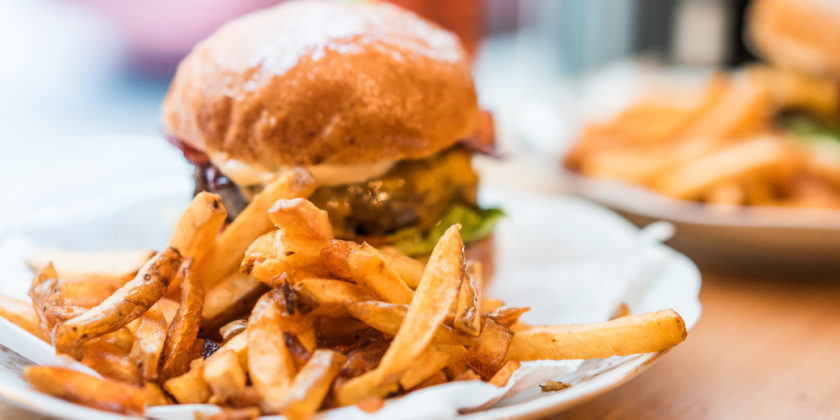Gastroesophageal reflux1 (GER) happens when your stomach contents come back up into your esophagus. Stomach acid that touches the lining of your esophagus can cause heartburn, also called acid indigestion. Gastroesophageal reflux disease (GERD) happens when a muscle at the end of your esophagus does not close properly. This allows stomach contents to leak back, or reflux, into the esophagus and irritate it. GERD affects about 20 percent of the U.S. population2. This post, “7 Symptoms of Acid Reflux & Treatments,” provides information about this uncomfortable disease.
What’s GERD?
You may feel a burning in the chest or throat called heartburn. Sometimes, you can taste stomach fluid in the back of the mouth. If you have these symptoms more than twice a week, you may have GERD. You can also have GERD without having heartburn. Your symptoms could include a dry cough, asthma symptoms, or trouble swallowing.
Anyone, including infants and children, can have GERD. If not treated, it can lead to more serious health problems. In some cases, you might need medicines or surgery. However, many people can improve their symptoms by
- Avoiding alcohol and spicy, fatty or acidic foods that trigger heartburn
- Eating smaller meals
- Not eating close to bedtime
- Losing weight if needed
- Wearing loose-fitting clothes
What are the symptoms of GER and GERD3?
If you have gastroesophageal reflux (GER), you may taste food or stomach acid in the back of your mouth.
The most common symptom of gastroesophageal reflux disease (GERD) is regular heartburn, a painful, burning feeling in the middle of your chest, behind your breastbone, and in the middle of your abdomen. Not all adults with GERD have heartburn.
Other common GERD symptoms include
- bad breath
- nausea
- pain in your chest or the upper part of your abdomen
- problems swallowing or painful swallowing
- respiratory problems
- vomiting
- the wearing away of your teeth
Some symptoms of GERD come from its complications, including Esophagitis, Ulcers, and Respiratory problems.

What causes GER and GERD?
GER and GERD happen when your lower esophageal sphincter becomes weak or relaxes when it shouldn’t, causing stomach contents to rise up into the esophagus. The lower esophageal sphincter becomes weak or relaxes due to certain things, such as
- increased pressure on your abdomen from being overweight, obese, or pregnant
- certain medicines, including
- those that doctors use to treat asthma —a long-lasting disease in your lungs that makes you extra sensitive to things that you’re allergic to
- calcium channel blockers—medicines that treat high blood pressure
- antihistamines—medicines that treat allergy symptoms
- painkillers
- sedatives—medicines that help put you to sleep
- antidepressants —medicines that treat depression
- smoking, or inhaling secondhand smoke
A hiatal hernia can also cause GERD. A hiatal hernia is a condition in which the opening in your diaphragm lets the upper part of the stomach move up into your chest, which lowers the pressure in the esophageal sphincter.
When should I seek a doctor’s help?
You should see a doctor if you have persistent GER symptoms that do not get better with over-the-counter medications or change in your diet.
Call a doctor right away if you
- vomit large amounts
- have regular projectile, or forceful, vomiting
- vomit fluid that is
- green or yellow
- looks like coffee grounds
- contains blood
- have problems breathing after vomiting
- have pain in the mouth or throat when you eat
- have problems swallowing or painful swallowing

How do you control GER and GERD?
You may be able to control gastroesophageal reflux (GER) and gastroesophageal reflux disease (GERD) by
- not eating or drinking items that may cause GER, such as greasy or spicy foods and alcoholic drinks
- not overeating
- not eating 2 to 3 hours before bedtime
- losing weight if you’re overweight or obese
- quitting smoking and avoiding secondhand smoke
- taking over-the-counter medicines, such as Maalox, or Rolaids
How do doctors treat GERD4?
Depending on the severity of your symptoms, your doctor may recommend lifestyle changes, medicines, surgery, or a combination.
Lifestyle changes
Making lifestyle changes can reduce your GER and GERD symptoms. You should
- lose weight if needed.
- Wear loose-fitting clothing around your abdomen. Tight clothing can squeeze your stomach area and push acid up into your esophagus.
- Stay upright for 3 hours after meals. Avoid reclining and slouching when sitting.
- Sleep on a slight angle. Raise the head of your bed 6 to 8 inches by safely putting blocks under the bedposts. Just using extra pillows will not help.
- Quit smoking and avoid secondhand smoke.
Over-the-counter and prescription medicines
You can buy many GERD medicines without a prescription. However, if you have symptoms that will not go away, you should see your doctor.
All GERD medicines work in different ways. You may need a combination of GERD medicines to control your symptoms.
Antacids. Doctors often first recommend antacids to relieve heartburn and other mild GER and GERD symptoms. Antacids include over-the-counter medicines such as
- Maalox
- Mylanta
- Riopan
- Rolaids
Antacids can have side effects, including diarrhea and constipation.
Drug Treatments of GERD
H2 blockers. H2 blockers decrease acid production. They provide short-term or on-demand relief for many people with GER and GERD symptoms. They can also help heal the esophagus, although not as well as other medicines. You can buy H2 blockers over-the-counter or your doctor can prescribe one. Types of H2 blockers include
If you get heartburn after eating, your doctor may recommend that you take an antacid and an H2 blocker. The antacid neutralizes stomach acid, and the H2 blocker stops your stomach from creating acid. By the time the antacid stops working, the H2 blocker has stopped the acid.
Proton pump inhibitors (PPIs). PPIs lower the amount of acid your stomach makes. PPIs are better at treating GERD symptoms than H2 blockers.2 They can heal the esophageal lining in most people with GERD. Doctors often prescribe PPIs for long-term GERD treatment.
However, studies show that people who take PPIs for a long time or in high doses are more likely to have hip, wrist, and spinal fractures. You need to take these medicines on an empty stomach so that your stomach acid can make them work.
Several types of PPIs are available by a doctor’s prescription, including
- esomeprazole (Nexium)
- lansoprazole (Prevacid)
- omeprazole (Prilosec, Zegerid)
- pantoprazole (Protonix)
- rabeprazole (AcipHex)
Talk with your doctor about taking lower-strength omeprazole or lansoprazole, sold over the counter.
Prokinetics. Prokinetics help your stomach empty faster. Prescription prokinetics include

Both of these medicines have side effects, including
- nausea
- diarrhea
- fatigue, or feeling tired
- depression
- anxiety
- delayed or abnormal physical movement
Prokinetics can cause problems if you mix them with other medicines, so tell your doctor about all the medicines you’re taking.
Antibiotics. Antibiotics, including erythromycin, can help your stomach empty faster. Erythromycin has fewer side effects than prokinetics; however, it can cause diarrhea.
This post, “7 Symptoms of Acid Reflux & Treatments,” hopefully provided some useful information for your use.
Enjoyed this post? Share it and read more here. Jay Harold has put together a Resource page that you may find useful when trying to improve your health and wealth. Please take this advice from Muhammad Ali and give back to others. “Service to others is the rent you pay for your room here on earth.”
Bibliography
- https://medlineplus.gov/gerd.html
- https://www.niddk.nih.gov/health-information/digestive-diseases/acid-reflux-ger-gerd-adults/definition-facts
- https://www.niddk.nih.gov/health-information/digestive-diseases/acid-reflux-ger-gerd-adults/symptoms-causes
- https://www.niddk.nih.gov/health-information/digestive-diseases/acid-reflux-ger-gerd-adults/treatment




